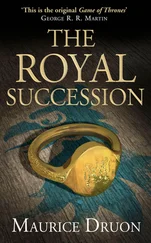He saw himself condemned for the rest of his life to crouching huddled behind a money-changer’s counter in Marseilles because he could not make the journey to Paris. If, that was, he died from no other disease. Every morning he saw one or two corpses carried out. They had already turned a horrible black colour, since there were always, as in every Mediterranean port, a few cases of plague about. And all this because he had wished to show off by jumping on to the quay before his companions. And when he had just escaped shipwreck too!
He was furious at fate and his own stupidity. He sent for the letter-writer almost every day and dictated to him long letters for Marie de Cressay which he sent by the couriers of the Lombard banks to the branch at Neauphle, so that the chief clerk might give them secretly to the girl.
With all the emphasis and richness of image which Italians use in speaking of love, Guccio sent the most passionate declarations. He assured her he only wished to get well for her sake, for the happiness of seeing her again, looking upon her, and cherishing her day by day for ever. He besought her to be faithful to the pact they had sworn, and promised her enduring happiness. ‘You dominate my whole heart, as no one else will ever do, and if you should fail me, my life too would fail.’
Now that he was confined through his own stupidity to a bed in the Hôtel-Dieu, he was presumptuous enough to begin to doubt everyone and everything and to fear that the girl he loved was no longer waiting for him. Marie would grow tired of an absent lover, would fall for some young provincial squire, a huntsman and champion in tournaments.
‘My good luck,’ he said to himself, ‘was to have been the first to love her. But now it is a year and soon will be eighteen months since we kissed each other for the first time. She will reconsider the matter. My uncle warned me. What am I in the sight of a daughter of a noble house? A Lombard, that is to say a little more than a Jew, a little less than a Christian, and most certainly not a man of rank.’
As he contemplated his wasted, motionless legs, wondering whether he would ever be able to stand upon them again, he described in his letters to Marie de Cressay the wonderful life he would give her. He had become the friend and protégé of the new Queen of France. To read his letters one might have thought that it was he alone who had negotiated the King’s marriage. He told of his embassy to Naples, the storm, and how he had behaved in it, relating the courage of the crew. He attributed his accident to a chivalrous design; he had leapt forward to assist Princess Clémence and to save her from falling into the sea, when she was on the point of leaving the ship, which was, even in harbour, still tossed by waves.
Guccio had also written to his uncle Spinello Tolomei describing his misfortune, begging that the Neauphle branch be kept for him and asking for a credit with their Marseilles correspondent.
He had a number of visitors who distracted his mind a little and gave him a chance of complaining in company, which is more satisfying than complaining to oneself. The representative of the Tolomei Bank was assiduous in his attentions and arranged for better food than that supplied by the hospital brothers.
One afternoon Guccio had had the pleasure of seeing his friend Signor Boccaccio di Cellino, senior traveller of the Bardi company, who happened to be passing through Marseilles. Guccio had been able to unburden himself to him as much as he pleased.
‘Think of all I’ll miss,’ Guccio said. ‘I shall not be able to attend Donna Clemenza’s wedding, where I would have taken my place among the great lords. Having done so much to bring it about, it really is bad luck not being able to be there! And I shall also miss the coronation at Rheims. It’s really quite intolerable. And I’ve had no reply from my darling Marie.’
Boccaccio did his best to console him. Neauphle was not a suburb of Marseilles, and Guccio’s letters were not carried by royal couriers. They had to go by the usual Lombard stages, Avignon, Lyons, Troyes, and Paris; the couriers did not leave every day.
‘Boccacino, my dear friend,’ cried Guccio, ‘since you’re going to Paris, I beseech you, if you have the time, go to Neauphle and see Marie. Tell her all I’ve said! Find out if my letters have reached her safely; try and discover whether she still loves me. Don’t hide the truth from me, even if it’s unpalatable. Don’t you think, Boccacino, that I might travel in a litter?’
‘What, so that your wound can reopen, worms get into it, and that you may die of fever in some filthy inn upon the road? What an idea! Are you mad? Really, Guccio, you’re twenty now, after all.’
‘Not yet!’
‘All the more reason for staying where you are; what’s a month here or there at your age?’
‘If it happened to be the operative month, my whole life might be ruined.’
Princess Clémence sent one of her gentlemen every day to ask news of the invalid. Fat Bouville came three times himself to sit beside the young Italian’s bed. Bouville was overwhelmed with work and anxiety. He was doing his best to get the future Queen’s attendants properly fitted out before setting forth on the road to Paris. Exhausted by the voyage, some of the company had had to retire to bed. No one had any clothes but the soaked and spoiled garments they had been wearing when they disembarked. The gentlemen and ladies of the suite were placing orders with tailors and dressmakers without worrying about payment. The whole of the Princess’s trousseau, which had been lost at sea, was to be made again; silver, china, trunks, all the necessities of the road, which at the period formed the normal equipment for a royal personage’s journey, had to be bought again. Bouville had sent to Paris for funds; Paris had replied that Naples should be approached, since the loss had taken place during that part of the journey which was in the territorial waters of the Crown of Sicily. The Lombards had had to be brought into play. Tolomei had remitted the demands to the Bardis, the usual money-lenders of King Robert of Naples; which explained Signor Boccaccio’s short stay in Marseilles, since he was on his way to arrange matters. In these chaotic circumstances Bouville much missed Guccio’s assistance, and when the ex-Chamberlain came to visit him, it was more to complain of his own lot and to ask the young man’s advice than to bring him comfort. Bouville had a way of looking at Guccio which seemed to imply: ‘Really, how could you do this to me!’
‘When are you leaving?’ Guccio asked him, looking forward to the moment with despair.
‘Oh, my poor friend, not before the middle of July.’
‘Perhaps by then I shall be well.’
‘I hope so. Do your best; your being well again would be a great help to me.’
But the middle of July came without Guccio being up on his feet, far from it indeed. The day before her departure, Clémence of Hungary insisted upon saying goodbye to the sick man herself. Guccio was already much envied by his companions in the hospital for the number of visitors who came to see him, the solicitude with which he was surrounded, and the ease with which his demands were satisfied. He became an almost legendary and heroic figure when the fiancée of the King of France, accompanied by two ladies-in-waiting and six Neapolitan gentlemen, strode in through the doors of the great ward of the Hôtel-Dieu. The brothers, who were singing vespers, looked at each other in astonishment, and their voices turned a little hoarse. The beautiful Princess knelt down, like the most humble of the faithful, and then, when the prayers were over, advanced down between the beds, through the long expanse of suffering, followed by a hundred pairs of astonished eyes.
Читать дальше












